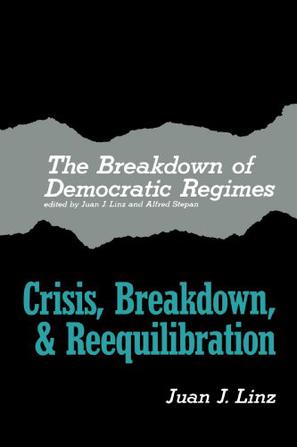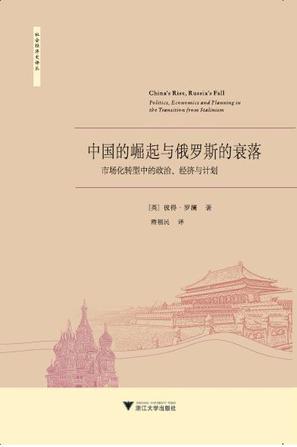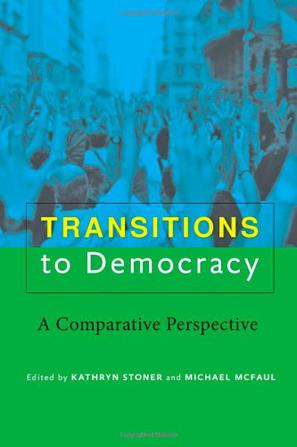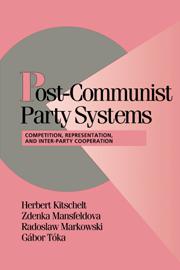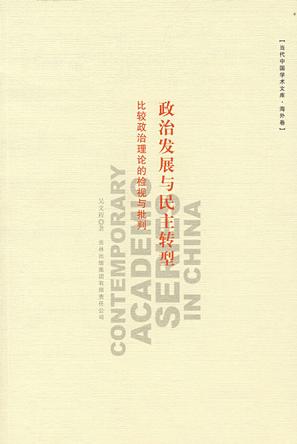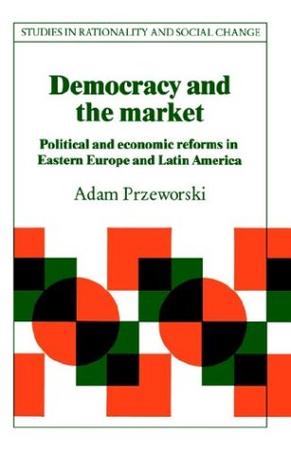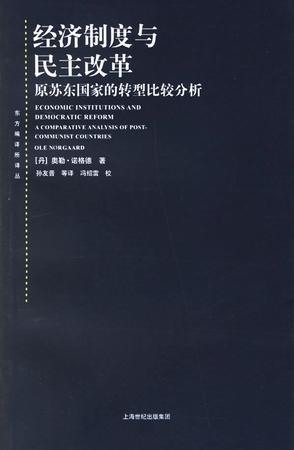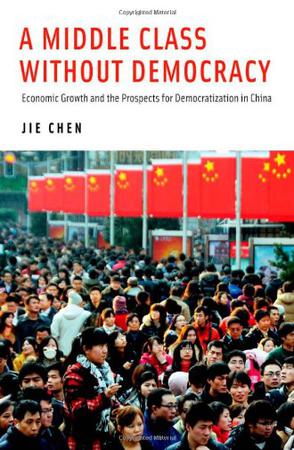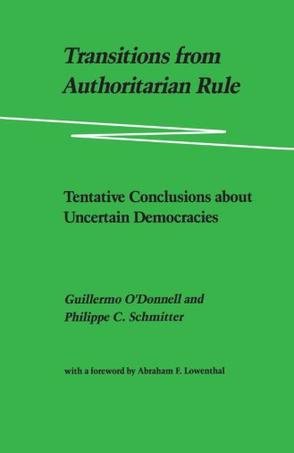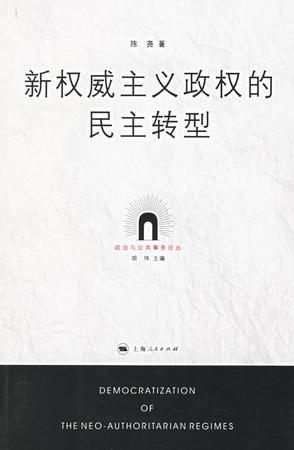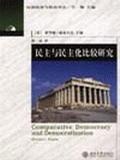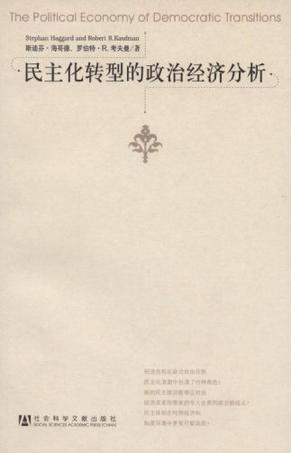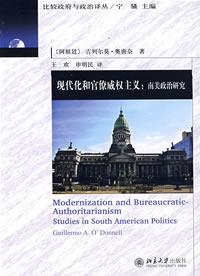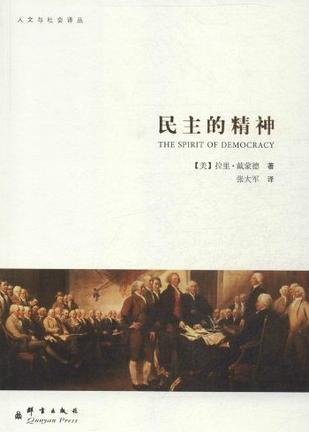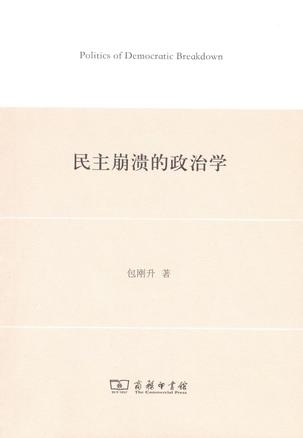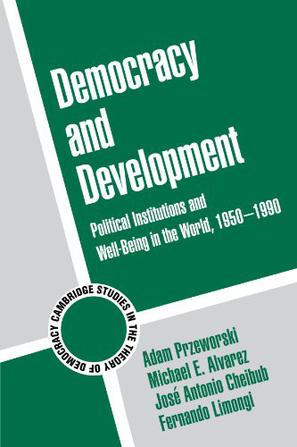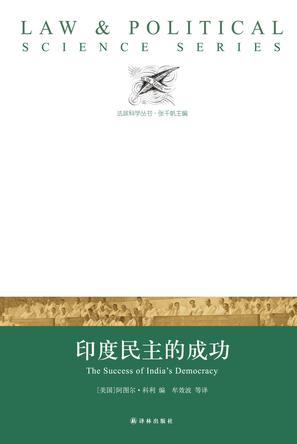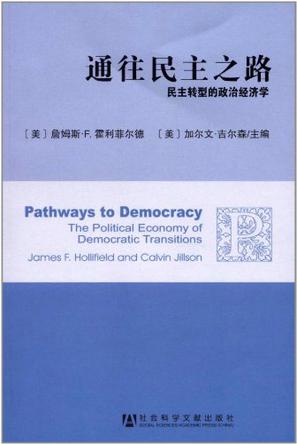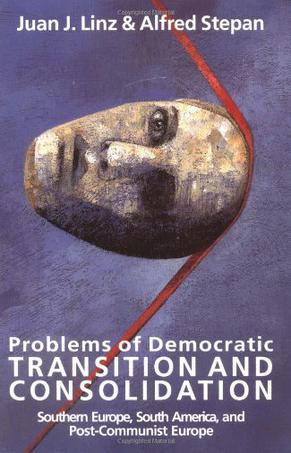欢迎来到相识电子书!
标签:民主转型
-
The Breakdown of Democratic Regimes
"A rich collection of challenging studies that, in addition ot supplying useful data on the performance of democratic institutions in a variety of settings, gives us a good example of how collaborative, cross-national explanatory research can be conducted." -- Journal of Politics -
中国的崛起与俄罗斯的衰落
这本书系统地分析了中国和俄罗斯改革的差异。在作者看来,俄罗斯的“休克疗法”是失败的,而中国的渐进式改革是成功的。而存在这种差异的原因主要在于两国选择的政策不同。俄罗斯选择了“大爆炸”式方法,即“休克疗法”。“休克疗法”代表了一种正统的转轨理论,认为经济改革的成功需要共产主义政治体制的改变。罗澜认为俄罗斯政策选择上的错误应归咎于西方新古典经济理论家,他们建议莫斯科和国际货币基金组织等机构接受新古典经济学的分析作为给予国际援助的条件的理论基础。中国与之不同,政策选择上没有听从国际组织和新古典经济理论家的建议,而是根据中国的实际自主抉择,“摸着石头过河”,因此获得了成功。 -
Transitions to Democracy
Review Successfully traces the interaction between domestic and international actors during regime transitions in a wide range of cases from the 1970s to the 2000s. Each chapter provides a font of primary research very rarely found in edited volumes of this sort. In particular, this book offers a unique source of detail on U.S. foreign policy towards a wide range of countries at various points over the last thirty years. Nowhere is so much detail on so many cases available in a single book. (Lucan Way, University of Toronto ) Book Description Fifteen case studies by scholars and practitioners demonstrate the synergy between domestic and international influences that can precipitate democratic transitions. -
Post-Communist Party Systems
Post-Communist Party Systems examines democratic party competition in four post-communist polities in the mid-1990s, Bulgaria, the Czech Republic, Hungary, and Poland. Legacies of pre-communist rule turn out to play as much a role in accounting for differences as the institutional differences incorporated in the new democratic rules of the game. The book demonstrates various developments within the four countries with regard to different voter appeal of parties, patterns of voter representation, and dispositions to join other parties in legislative or executive alliances. The authors also present interesting avenues of comparison for broader sets of countries. -
Competitive Authoritarianism
Review "This landmark contribution to the comparative study of political regimes will be widely read and cited. In an epic act of theoretical synthesis, Levitsky and Way weave careful empirical research on three-dozen countries across five world regions into a convincing account of patterns of regime change. In distinguishing democratic transitions from a range of authoritarian outcomes, they reach nuanced conclusions about the relative explanatory influence of international factors (linkage and leverage) and domestic power politics (rulers versus oppositions). Above all, they help us understand how autocrats learn to live with elections. Strongly recommended." - Michael Bratton, University Distinguished Professor of Political Science and African Studies, Michigan State University "This is a brilliant and truly pathbreaking book that should be closely studied by any serious student of democracy or comparative politics. Its precise conceptualization, striking theory, rigorous comparative methodology, and breathtaking range of case study evidence distinguish it as the most important study of political regimes and regime transitions in a generation." - Larry Diamond, Stanford University "Competitive Authoritarianism establishes Steven Levitsky and Lucan Way as the Juan Linz and Alfred Stepan of their generation. In the tradition of Linz and Stepan, Levitsky and Way offer an abundance of theoretical and conceptual innovation as well as a trove of empirical material drawn from broad swaths of the globe. The book is as elegantly written as it is theoretically creative. It is written by and for professional social scientists; yet undergraduates and the attentive public will be able to digest the book's central argument and findings with ease. This is what social science should look like." - M. Steven Fish, University of California, Berkeley "This is the most anticipated book in comparative politics in more than a decade. Written in a single authorial voice, Levitsky and Way's arguments about the distinct trajectories of competitive authoritarian regimes are theoretically grounded, conceptually nuanced, geographically wide ranging, and empirically well supported. I expect this book to have a major impact on the field for many years to come." - Marc Morjé Howard, Georgetown University "Levitsky and Way's book makes two major contributions to research on political regime change. First, by developing the notion of competitive authoritarianism, it engages in a sustained effort to provide a clear and theoretically fertile conception of a particular subset of political regimes belonging to the vague class of 'hybrid' regimes. Second, it offers the as yet most sophisticated and subtle effort to interweave domestic and international explanations of political regime change with provocative implications for run-of-the-mill theories, whether based on economic development, inequality, or institutions." - Herbert Kitschelt, Duke University "Regimes that blend meaningful elections and illicit incumbent advantage are not merely resting points on the road to democracy; Levitsky and Way guide us along the multiple paths these regimes can take and provide powerful reasoning to explain why nations follow these distinct paths. This deeply insightful analysis of an important subset of post-Cold War regimes is conceptually innovative and precise, empirically ambitious, and theoretical agile, moving fluidly between international and domestic causes of regime dynamics. Read it to understand the dynamics of contemporary hybrid regimes; then read it again to appreciate its many lessons for our general understanding of regime change." - David Waldner, University of Virginia Product Description Competitive authoritarian regimes - in which autocrats submit to meaningful multiparty elections but engage in serious democratic abuse - proliferated in the post-Cold War era. Based on a detailed study of 35 cases in Africa, Asia, Latin America, and post-communist Eurasia, this book explores the fate of competitive authoritarian regimes between 1990 and 2008. It finds that where social, economic, and technocratic ties to the West were extensive, as in Eastern Europe and the Americas, the external cost of abuse led incumbents to cede power rather than crack down, which led to democratization. Where ties to the West were limited, external democratizing pressure was weaker and countries rarely democratized. In these cases, regime outcomes hinged on the character of state and ruling party organizations. Where incumbents possessed developed and cohesive coercive party structures, they could thwart opposition challenges, and competitive authoritarian regimes survived; where incumbents lacked such organizational tools, regimes were unstable but rarely democratized. -
政治发展与民主转型
《政治发展与民主转型:比较政治理论的检视与批判》是一本理论取向的教科书,该书对当代比较政治学的基本理论和概念进行了了全面而严谨的检视和批判。书中涉及到的实际政治事件都是只是作为例子加以描述,借以说明道理,并不针对任何个案中的人、事、政策提出检讨、批判或建议。 -
Democracy and the Market
The quest for freedom from hunger and repression has triggered in recent years a dramatic, worldwide reform of political and economic systems. Never have so many people enjoyed, or at least experimented with democratic institutions. However, many strategies for economic development in Eastern Europe and Latin America have failed with the result that entire economic systems on both continents are being transformed. This major book analyzes recent transitions to democracy and market-oriented economic reforms in Eastern Europe and Latin America. Drawing in a quite distinctive way on models derived from political philosophy, economics, and game theory, Professor Przeworski also considers specific data on individual countries. Among the questions raised by the book are: What should we expect from these experiments in democracy and market economy? What new economic systems will emerge? Will these transitions result in new democracies or old dictatorships? -
经济制度与民主改革
本书是一本针对原苏东国家的政治经济转型进行深入学术分析和理论思考的力作。全书涉猎广泛,综合运用全球资本主义、民主化、经验制度主义和历史制度主义等理论,结合比较统计法和个案分析法,以全球视野审视当前正在推行市场化和民主化改革的转型国家,重点剖析原苏东20国在过去十年(1989—1999)的经验教训,深入探讨市场与民主、经济转型与政治改革之间的关系。 全书从外部结构变量(初始条件和外部环境)和内部转型战略两个层面入手,以政治学视角剖析经济体制改革,将其划分为美国、西欧和东亚三种转型模式。作者旨在回答下述问题:为什么有些国家在实施经济转型方面比其他国家能力更强、成就更显著?激进转型战略与渐进转型战略哪一种更优越?哪一种模式是最佳转型模式?本书的结论发人深思,对于当前正在思考中国改革得失、探索未来改革之路的国内学者来说,具有深刻的启迪和借鉴意义。 -
A Middle Class Without Democracy
What kind of role can the middle class play in potential democratization in such an undemocratic, late developing country as China? To answer this profound political as well as theoretical question, Jie Chen explores attitudinal and behavioral orientation of China's new middle class to democracy and democratization. Chen's work is based on a unique set of data collected from a probability-sample survey and in-depth interviews of residents in three major Chinese cities, Beijing, Chengdu and Xi'an—each of which represents a distinct level of economic development in urban China-in 2007 and 2008. The empirical findings derived from this data set confirm that (1) compared to other social classes, particularly lower classes, the new Chinese middle class-especially those employed in the state apparatus-tends to be more supportive of the current Party-state but less supportive of democratic values and institutions; (2) the new middle class's attitudes toward democracy may be accounted for by this class's close ideational and institutional ties with the state, and its perceived socioeconomic wellbeing, among other factors; (3) the lack of support for democracy among the middle class tends to cause this social class to act in favor of the current state but in opposition to democratic changes. The most important political implication is that while China's middle class is not likely to serve as the harbinger of democracy now, its current attitudes toward democracy may change in the future. Such a crucial shift in the middle class's orientation toward democracy can take place, especially when its dependence on the Party-state decreases and perception of its own social and economic statuses turns pessimistic. The key theoretical implication from the findings suggests that the attitudinal and behavioral orientations of the middle class-as a whole and as a part-toward democratic change in late developing countries are contingent upon its relationship with the incumbent state and its perceived social/economic wellbeing, and the middle class's support for democracy in these countries is far from inevitable. -
Transitions from Authoritarian Rule, Vol. 4
Review "The essays appearing in the collection 'Transitions from Authoritarian rule'...will serve as reference points for students of redemocratization for years to come. Other essays will serve as classic case studies...the volumes deserve to be read time and again."--Nancy Bermeo, 'Comparative Politics' Review "The essays appearing in the collection Transitions from Authoritarian rule... will serve as reference points for students of redemocratization for years to come. Other essays will serve as classic case studies... the volumes deserve to be read time and again." -- Nancy Bermeo, Comparative Politics -
新权威主义政权的民主转型
20世纪70年代中期兴起的全球范围向民主的转型,标志着民主事业在人类政治文明发展进程中迈出了关键一步。
绝大多数有关这一时期民主化原因的研究均归结于外力或政治之外因素的作用,比如国际力量的推动、经济结构危机、邻国的示范效应,即使极少数学者从政治本身出发,也只是从精英选择的角度分析,很少有学者将研究的重点放在政治体制和政权内部结构。按照马克思主义的观点,这些研究方法忽视了社会活动的基本规律,即任何事物在其发展进程中,变革的决定性因素在于内部而不是外部,换言之,事物的发展取决于内因而不是外因。因此,政治变革中的民主化的根本原因在于前民主化政权内部结构的问题,本书正是从这一角度出发,研究新权威主义政权内部的结构变化所导致的民主转型。
本书分为七个部分。
第一章为引论。分析了选题的原因、研究方法和研究所要注意的几个方面。在20世纪末的民主化背景下,人们对新权威主义政权的转型认识是模糊的,对新权威主义政权的发展历程及其历史命运难以把握。理论上的模糊也使得政治精英们的选择失去了方向,从而使政治变迁显得扑朔迷离,政治现代化的进程充满艰难。如何理解新权威主义政权转型的根本动因,是本书尝试进行解释的。关于新权威主义政权的研究在理论上主要有两个来源:比较研究方法和政治发展理论,对此本书作了简单的回顾。此外,这一部分还对研究所注意的几个方面进行了简要提示。
第二章为概念与理论。对权威主义、新权威主义的概念进行了梳理,并从两个维度——意识形态和政权形态分析了权威主义的表现形态。
第三章分析了新权威主义政权的兴起。新权威主义政权是现代化进程的产物,是现代化进程中制度变迁在政治结构体制上的反应,这种反应受到了殖民主义的历史、前现代化的经济结构、政治文化传统等因素的重要影响,同时也受制于社会发展过程中的即时事件的作用。发展中国家进行了制度容纳的尝试,包括多元民主体制、形形色色的社会主义体制及寡头或军人政权,但大多不成功。在工业化进程及其带来的社会、经济危机的冲击下,少数发展中国家最终选择了新权威主义体制。
第四章分析了新权威主义政权的结构及结构性危机。结构是研究政治的一个关键性变量。新权威主义政权内部存在两种结构:专制结构和同意结构。专制结构主要由行政首脑及行政机构、军队、技术官僚和政党组成。同意结构则由代议机构、利益集团、公共舆论和社会运动组成。新权威主义政权中专制结构和专制权力占据了主导地位,同意结构和同意权力很少或几乎不发挥作用,政权主要依靠强制、镇压、说服来维持社会秩序和推动经济增长。现代化发展和社会变迁导致新权威主义政权内部的专制结构和同意结构之间形成了一种张力,这种张力是新权威主义政权不稳定的根源。新权威主义政权试图建立各种协调机制缓解张力,但政权的性质决定了专制结构的地位不可能被取代,从而也就决定了政权不可避免地走向危机。
第五章围绕新权威主义政权的有效性和合法性展开论述。新权威主义政权的结构性危机并不导致其即刻的解体,政权的有效性在一定程度上维护了政权的生存。新权威主义政权的有效性来源于其对经济发展的推动作用。通过对政治结构与经济发展之问关系的考察,本书认为,政治发展与经济发展之间并没有简单、直接的逻辑关系,新权威主义政权相对于其他发展中国家取得了较大的经济发展成就,不在于其经济发展战略或政策的合理,而在于政权的能力。经济绩效在一定程度上维护了政权的合法性,但有效性不等于合法性,现代化发展到了一定时期,政权的有效性也就无法满足社会对政权合法性的要求。这种外部因素仍然不能克服政权结构本身内在的结构性危机。
第六章描述了新权威主义政权在“第三波”民主化浪潮中的解体。新权 威主义政权的结构性危机在内部和外部因素的推动下终于全面爆发,在体制上逐步向民主转型。但是,由于大多数转型是外部力量的推动或政治精英的主动选择,因此转型后面临着政治体制的巩固问题。如何巩固民主体制是新权威主义政权在转型之后必须应付的重大挑战。
最后一部分分析向民主转型后的新生民主政权在巩固民主制度方面的努力,以及这些政权在民主制度巩固过程中受到的影响因素,包括社会经济因素、政治传统、转型的方式、情境问题以及具体民主制度的选择等。不同的影响因素对转型后的民主政权的巩固产生了不同的作用。尽管有少数国家仍然处于转型后的动荡之中,但大多数政权在转型之后基本上坚持了下来。
至今为止,新权威主义政权在民主道路上尽管艰难,但却始终朝向民丰的目标前行。 -
民主化转型的政治经济分析
在利用当代政治经济学理论以及十二年拉丁美洲和亚洲经验研究的基础上,本书作者发展了一种研究民主化转型的新视角:从分析经济危机和威权退却的关系开始,继而分析了威权统治的经济和制度遗产如何影响新民主政府发动和保持经济政策改革的能力,最后分析了政治经济改革成果在长时段内巩固的问题。作者在本书中强调了经济环境、竞争性群体的利益和权力以及代表机构(尤其是政党)居间调节角色的关系。 -
现代化和官僚威权主义
《现代化和官僚威权主义:南美政治研究》是著名政治学家奥唐奈的代表性著作。这是一本有关威权主义政体民主化的杰出著作,它阐释的“官僚威权主义”模式,是政治发展理论和拉美政治研究中一个里程碑式的成就。它探讨了工业化—经济增长与民主化之间的复杂关系,是最早突破二者之间简单的因果关系框架的代表性文献之一,在比较政治学中具有重要的范式意义。 -
民主的精神
本书系统回顾了“第三波”民主化浪潮的兴起与衰退过程,在其广阔、权威的国际发展趋势调研基础之上,对民主的构成、发展动因及本质做出了详细的论述,对西方民主体制的缺陷及发展前景也做出了客观的分析,并对世界范围内民主发展和维系状况进行了全面的学术思考。 -
民主崩溃的政治学
民主政体的崩溃是影响重大的政治事件。民主政体为什么会崩溃?本项研究试图系统地解释民主崩溃的原因和因果机制。现有文献从阶级斗争和不平等、经济落后及不稳定、结构性社会分裂、政治制度缺陷、政治精英行为与选择,以及国际因素等几种理论路径来解释民主崩溃。但是,现有理论的系统性和严谨性存在不足,适用的时空范围也比较有限。作者试图在已有研究基础上对民主崩溃提出一个新的理论解释:如果一个民主国家符合两个条件:一是选民政治分裂程度高,二是离心型政治制度安排,那么该国民主政体就倾向于崩溃。 民主政体的崩溃通常都起源于国内社会的某种政治紧张关系,如果这种政治紧张关系愈演愈烈,就会导致严重的政治危机。当这种政治危机无法在现有的民主政体框架内解决时,就会导致民主政体的崩溃。因此,理解政治危机的形成和激化,是解释民主崩溃的关键。政治危机的形成和激化需要两个条件。第一个条件是国内不同社会集团之间存在较为严重的政治冲突,而这种政治冲突是不同选民集团存在严重政治分裂的反映。第二个条件是民主国家没有能力去解决这种严重的政治冲突。因此,国家能力的高低也直接关系到民主政体的稳定性。固然,国家能力受到多种因素的影响,但民主政体下的政治制度安排很大程度上能决定国家能力的高低。从制度主义的视角讲,离心型民主政体会显著地削弱国家能力,从而使其无法应付剧烈的政治冲突。作者的观点可以归纳为:高度的选民政治分裂导致严重的政治冲突,而离心型制度安排无法塑造有效的国家能力,两者的结合倾向于导致民主政体的崩溃。 这项研究采用比较历史分析方法,在重点横向比较德国(1919-1933年)、尼日利亚(1960-1966年)、智利(1964-1973年)三个民主崩溃案例和印度(1947年至今)一个民主存续案例的同时,还对四国不同时期的民主经历进行了纵向比较,以揭示选民政治分裂程度和政治制度安排对民主崩溃或维系的影响。作者希望这项研究能对如何避免新兴民主政体的失败提供富有价值的启示。 -
印度民主的成功
本书主要关注了权力在印度的分配方式,认为它在中央集权与地方分权之间实现了一种微妙的平衡,即在没有完全排除边缘阶层的情况下,社会中强势集团的利益得到了满足。书中讨论了民主制度的巩固,也论及了推动或阻碍民主发展的力量,从而全面揭示了印度在探索民主政体构建方面所取得的成功。 -
通往民主之路
《通往民主之路:民主转型的政治经济学》讲述了,20世纪后期,人们比以往更能自由地主宰个人的命运,追求个人的经济利益。共产主义已经衰退,专制体制也在垂死挣扎。虽有偶发极端事件,但世界仍处于和平状态。这种自由民主式的和平不是基于权力制衡,而更多的是基于在自由国家的相互依赖体系和多样化的国际组织支撑下所形成的市场与权利的双重驱动。 《通往民主之路:民主转型的政治经济学》考察了不同国家——包括拉丁美洲、亚洲、东欧、非洲国家——所采取的不同民主转型路径,以及稳定新的民主体制所需要的政治和经济方案。通过分析军管体制、专制体制的寡头政治集团,揭示了统治集团内的分歧怎样推动了民主转型,统治集团外的群体和利益集团怎样发出挑战,以及为什么结果往往是经济表现不佳。本书还就美国外交政策对民主化的推动和投入问题进行了广泛探讨。 在众多有关“向民主转型”的文集中,本书不仅是最新的、最权威的,也是最好的。本书对专制体制向民主体制转型中的成功、踌躇,以及超乎想象的一面进行了比较研究,睿智、坦诚。令人耳目一新。 -
Problems of Democratic Transition and Consolidation
Since their classic volume The Breakdown of Democratic Regimes was published in 1978, Juan J. Linz and Alfred Stepan have increasingly focused on the questions of how, in the modern world, nondemocratic regimes can be eroded and democratic regimes crafted. In Problems of Democratic Transition and Consolidation, they break new ground in numerous areas. They reconceptualize the major types of modern nondemocratic regimes and point out for each type the available paths to democratic transition and the tasks of democratic consolidation. They argue that, although "nation-state" and "democracy" often have conflicting logics, multiple and complementary political identities are feasible under a common roof of state-guaranteed rights. They also illustrate how, without an effective state, there can be neither effective citizenship nor successful privatization. Further, they provide criteria and evidence for politicians and scholars alike to distinguish between democratic consolidation and pseudo-democratization, and they present conceptually driven survey data for the fourteen countries studied. Problems of Democratic Transition and Consolidation contains the first systematic comparative analysis of the process of democratic consolidation in southern Europe and the southern cone of South America, and it is the first book to ground post-Communist Europe within the literature of comparative politics and democratic theory.
热门标签
下载排行榜
- 1 梦的解析:最佳译本
- 2 李鸿章全传
- 3 淡定的智慧
- 4 心理操控术
- 5 哈佛口才课
- 6 俗世奇人
- 7 日瓦戈医生
- 8 笑死你的逻辑学
- 9 历史老师没教过的历史
- 10 1分钟和陌生人成为朋友

